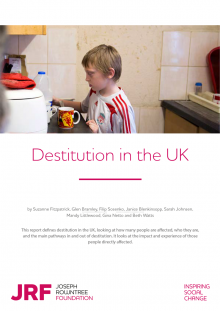Sam Thomas (@iamsamthomas)
In an important report published today, the Joseph Rowntree Foundation provides stark new evidence on the scale of destitution in the UK. Based on detailed research by colleagues at Heriot-Watt University, it reveals that 1.25 million individuals annually find themselves unable to afford the basic essentials they need to eat, keep clean and stay warm and dry.
Within this group, around a third have slept rough, begged or accessed a service intended to support complex needs such as substance misuse, mental ill health and contact with the Criminal Justice System. These issues are a huge part of the picture of destitution in the UK, and MEAM was glad to be involved in the research as a member of the advisory group.
The research shows that there are few straightforward reasons for why people become destitute. Income plays a large part: delays or interruptions to benefits, as well as debt and arrears payments, loom large in the findings. But for those with the most complex needs, being unable to afford life’s basics is often the result of a more complex web of factors, including relationship breakdown and domestic violence.
The research identifies that people with more complex needs (which includes many of the people that MEAM and its partners work to support) experience longer periods of destitution and sometimes have no money to hand for months or even years. This is also true for migrants, particularly those claiming asylum. People in these situations can become incredibly isolated, and lacking friends or a network of support become reliant on benefits, voluntary services and sometimes begging.
The study found that most people who are fit for work see employment as the best route out of destitution. However, for most, the immediate challenge is resolving issues with their benefit claims and, particularly for those with the most complex needs, finding appropriate accommodation and support to address the wider issues in their lives. Even those who are able to improve their situation remained vulnerable to sudden changes in circumstances, such as their benefit entitlements.
The research highlights the importance of ensuring people are properly supported by the benefits system, which should be the first line of support for people who are destitute. This has clear parallels with MEAM’s current work on employment support. However, it also shows that without effective support for the underlying problems that lead to destitution, people will struggle to move on.
The research is invaluable in highlighting both the scale of the problem, and the complexity of the response that’s needed. There are already good examples of how local areas (such as those we support in using the MEAM Approach) can help people address the long-term issues that they face – but this report shows how much more work there is to do. We hope it is read widely and carefully, and look forward to collaborating more with the JRF on these issues as their work develops.

